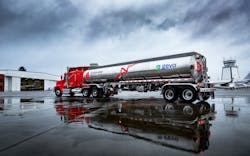Avfuel to Demonstrate Viability of Sustainable Aviation Fuel at Jackson Hole Aviation
In an effort to further business aviation’s carbon neutrality goals, Avfuel will make sustainable aviation fuel (SAF) available to operators fueling at Jackson Hole Aviation on September 3 and 4.
For the event, Avfuel will supply 7,300 gallons of SAF to the FBO to fuel operators flying in and out of the airfield during the demonstration days.
“We’re committed to raising awareness on the viability of sustainable aviation fuel,” said Keith Sawyer, manager of alternative fuels for Avfuel. “Events like these show that the product exists, it is safe, it is simply jet fuel and it provides a great benefit to our environment. By raising awareness, we’re hoping to garner commitments from more operators to use SAF and present those commitments to producers, in essence saying: ‘Here are our customers. The demand is there. We simply need the supply.’”
Supply of SAF continues to be the most challenging hurdle to bringing the product to market on a commercial scale. By focusing on commitments, Avfuel is hoping to encourage further production for greater sustainable representation in the fuel supply chain.
This SAF demonstration is held in conjunction with the airport’s Ribbon Cutting Ceremony for its new underground stormwater detention and filtration system on September 3. The new system will capture stormwater runoff from both the operational and public areas of the airport, preserving the land and environment surrounding the airport, making for a unique, eco-focused event.
Avfuel sources it concentrated SAF from Gevo, Inc., and blends it with petroleum-based jet fuel. This mixture is then tested for fuel quality and to ensure it meets ASTM D1655 standards. The product has a net benefit to the environment across its lifecycle. Created from corn starch, for every one million gallons of the concentrated SAF that is produced, approximately 20 million pounds of animal feed and protein is sold into the food chain, and the final jet fuel product burns cleaner, reducing carbon emissions released into the atmosphere.


